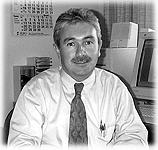Bilkent has become the leader in establishing a traffic model for Turkey. Last week, TRT1 Radio Station invited  Dr. İhsan Sabuncuoğlu, Head of Bilkent Traffic Committee, for an interview to discuss how the Traffic Committee was formed, its development and its future plans. When İhsan Sabuncuoğlu was asked about the mission of the Traffic Committee, he replied, "Five years ago Prof. Ali Doğramacı decided to form a Traffic Committee for the University. The mission of the Committee was to increase public awareness and regulate traffic on campus, and to make improvements on the current status."
Dr. İhsan Sabuncuoğlu, Head of Bilkent Traffic Committee, for an interview to discuss how the Traffic Committee was formed, its development and its future plans. When İhsan Sabuncuoğlu was asked about the mission of the Traffic Committee, he replied, "Five years ago Prof. Ali Doğramacı decided to form a Traffic Committee for the University. The mission of the Committee was to increase public awareness and regulate traffic on campus, and to make improvements on the current status."
İhsan Sabuncuoğlu spoke of the progress of the Committee over the last five years; namely, the provision of a traffic manual containing the traffic rules in both English and Turkish; the utilization of traffic-lights; the design and maintenance of a website (http://www.traffic.bilkent.edu.tr) to communicate effectively with university students and staff; and the establishment of a sticker-system so as to have easy access to information on drivers. These provisions have been augmented by the founding of the Bilkent Youth Traffic Team, and the the BAIS computer system, a database of vehicles, drivers, accidents etc., providing on-line support for traffic control.
"Bilkent is the first university to have traffic rules in its book of instructions and regulations," İhsan Sabuncuoğlu declared, "and the most important rule for us is that pedestrians have right-of-way on campus."
Bilkent is also the first in Turkey to use the radar system; and to limit car speed this has been integrated into a system of speed and radar traps, not to mention a squad of inveterate and omnipresent traffic cops. "We hope there will be no need for speed bumps and traps in the future," that excellent traffic behavior will become second nature and the system unnecessary.
Prof. Sabuncuoğlu ended the discussion with "We believe that traffic control at Bilkent University is a good traffic model for Turkey and we hope to make further progress in this area in the future."








